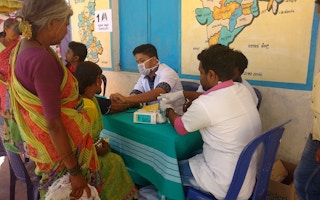The government authorities overseeing health policy in India have taken a landmark decision to include climate change and its impact on human health in the medical curriculum taught to would-be doctors and allied health workers. The decision of the National Centre for Disease Control (NCDC), an agency under the federal Ministry of Health and Family Welfare, aims to ensure that the upcoming generation of health professionals can apply more definitive causality for diseases on climate-related events and changes. Although yet to be formally introduced into the curriculum being currently used, it will extend to teaching schools that train dentists, nurses and allied health workers such as physiotherapists and students of traditional medicine.
To continue reading, subscribe to Eco‑Business.
There's something for everyone. We offer a range of subscription plans.
- Access our stories and receive our Insights Weekly newsletter with the free EB Member plan.
- Unlock unlimited access to our content and archive with EB Circle.
- Publish your content with EB Premium.
In an age when terms such as ‘landmark’, ‘pivotal’ and ‘game changing’ are used with a degree of latitude, this decision does indeed deserve plaudits, for several compelling reasons. One, India is witnessing the full impact of climate change and the related vagaries of extreme weather. Given its vast geographic spread and a multitude of local climatic conditions, the patterns of heat waves, unseasonal rain, prolonged summers, flooding and cyclones are changing. The year 2022 was recorded as the fifth hottest in India since record-keeping began, with the previous few years witnessing a rising trend too. Similarly, erratic monsoons and the early onset of summers have caused widespread concern amongst policymakers and scientists alike. While the economic, social, and environmental impact of this change is tragically extensive, the health impact is even more worrisome.
As per the 2022 Lancet Countdown on Climate Change and Health report, climate change is impacting the prevalence of a wide variety of diseases including respiratory conditions, some cancers, kidney disease, vector-borne illnesses and mental health. Take, for instance, lung cancer. A condition once inextricably linked with tobacco use and smoking is now increasingly being found in non-smokers. This rise has been attributed to poor air quality, an issue that has reached crisis proportions across cities in India – and is in large part due to the burning of fossil fuels. Similarly, rising temperatures are increasing the climatic suitability of mosquitoes that cause malaria and dengue. The most recent outbreak of dengue in Delhi in December 2022 – a winter month – proves what climate scientists and health researchers have been reporting. Allied to this is the fact that climate-induced food insecurity, water scarcity, forced migrations and disruptions to education will have far-reaching socio-economic and developmental impact on women and children. Given this, the case for including the impact of climate change in the medical curriculum is unequivocal.
The impact of this move will be on multiple fronts. One, through structured inclusion in the medical curriculum, the health impact of climate change will move from being a strong possibility to an evidence-based clinical science. It will also bring contemporary approaches towards epidemiology, etiology, diagnosis, and prognosis to an entire cohort of diseases from cancers to asthma, and mental health to malaria. Second, the move will also spur interest in further research on the intersectionality of the changing climate with disease, which can help contextualise the changing patterns of medical conditions in national, sub-national and regional milieus. Third, an aware medical professional can act like a force multiplier to help bring awareness on this subject to a wider section of society. Unlike many other professions, health professionals continue to enjoy a high degree of trust among the people they serve. Fourth, given their influence, it is hoped that health professionals will use this information to further effect change in public policy and alignment of resources towards decarbonisation and sustainability in the country.
Having made the announcement, the government would do well to implement it by revising the curriculum at the earliest. India’s medical education system has had a chequered past and would require the government’s heft to make implementation a reality. Mechanisms would also need to be put in place for the periodic review of the curriculum, given how quickly evidence is emerging and contexts are changing on climate issues. Also, beyond doctors and health professionals, this subject must be taught to India’s million-strong “ASHA” workers who deliver preventive, promotive, pre- and ante-natal care and health education in the villages and small towns of India. The building blocks of good health lie in healthy villages, the very places where the impacts of climate change are being felt the most.
Having taken a lead in bringing climate change into the medical curriculum – India is among the world’s few countries to have done so – the momentum should move beyond headlines to action in the clinical lecture room.
Dr Karan Thakur is an award-winning healthcare administer, public speaker and policy expert on healthcare based in New Delhi. In 2022, Karan was chosen as the Eisenhower Fellowships Global Fellow, where his project is to study the impact of climate change on healthcare, decarbonisation and building resilience in healthcare institutions.


















